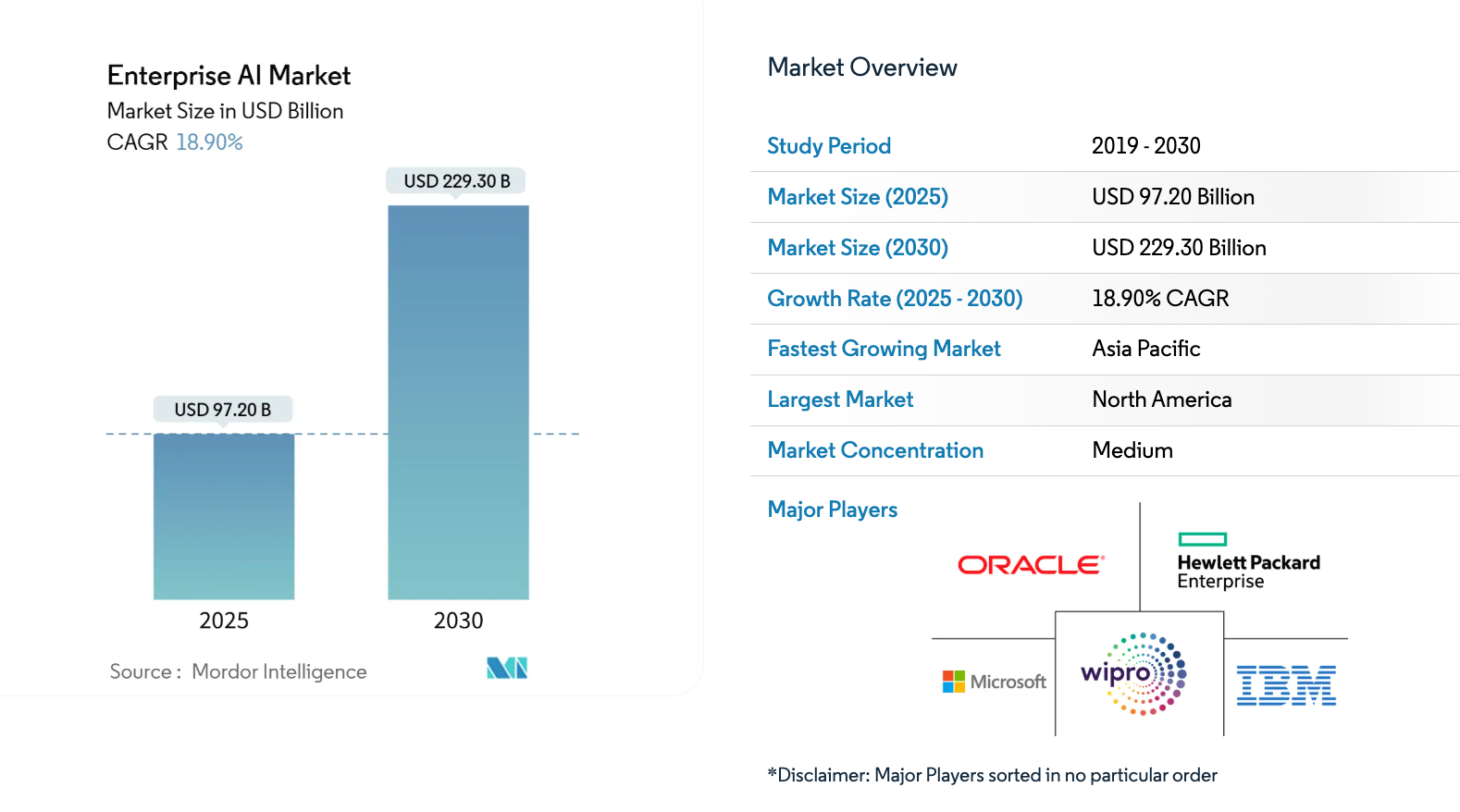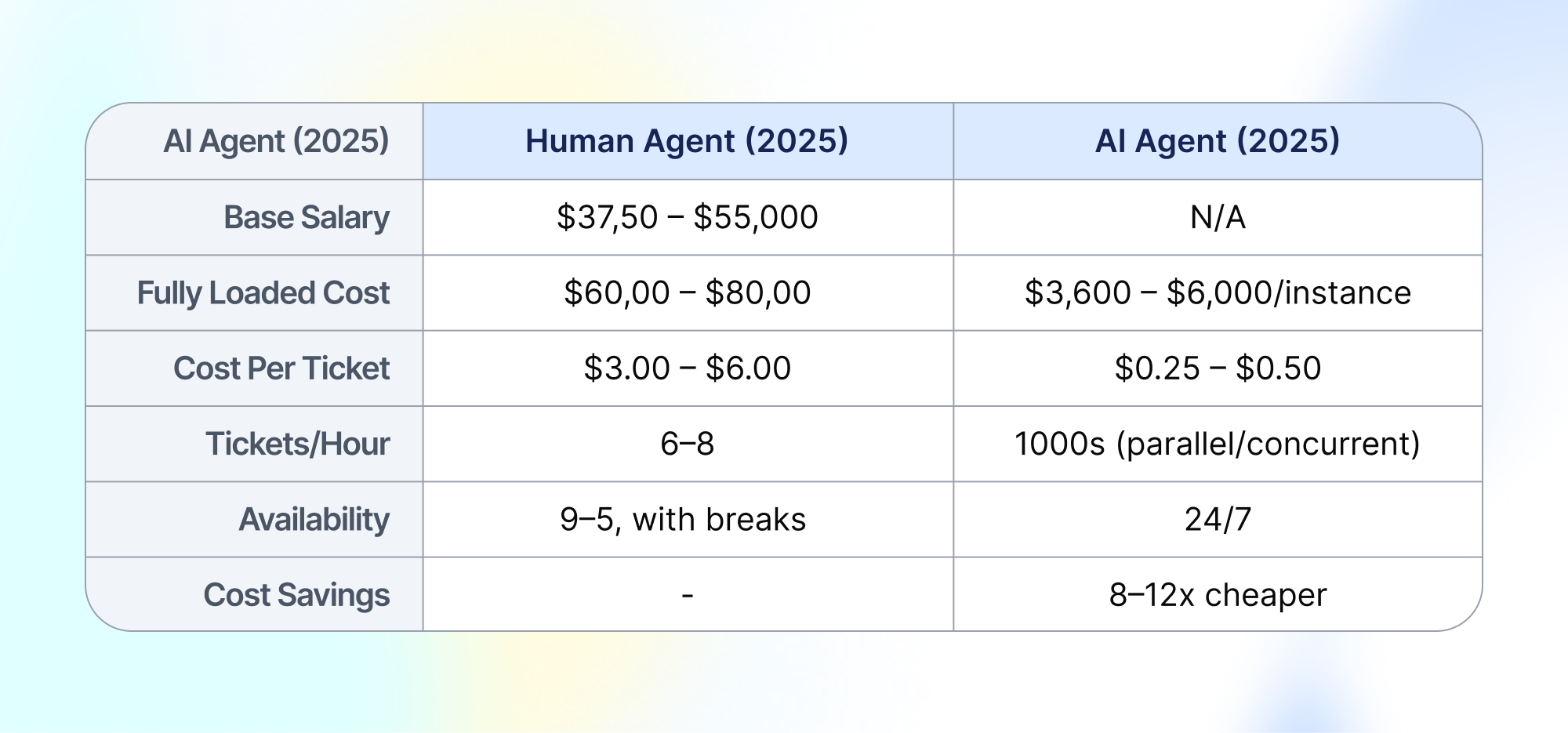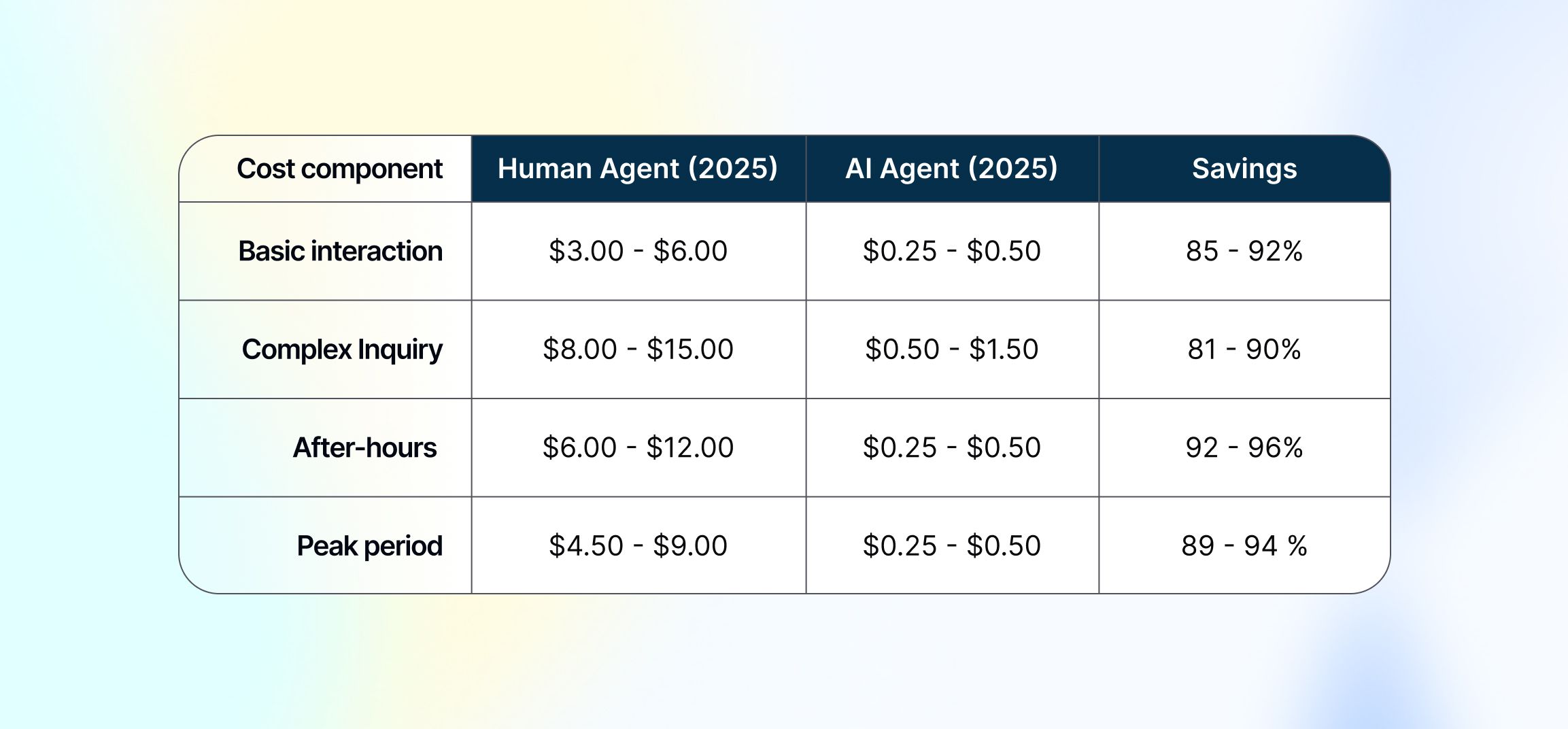Why Enterprise AI customer service is your next big ROI driver
The Enterprise AI Market is experiencing explosive growth, projected to surge from USD 97.20 Billion in 2025 to a staggering USD 229.30 Billion by 2030, at a Compound Annual Growth Rate (CAGR) of 18.90% (Source: Mordor Intelligence). This rapid expansion signals a pivotal moment for businesses.
The customer support landscape has reached a tipping point, with 95% of customer interactions expected to be AI-powered by 2025. Companies are already reporting average returns of $3.50 for every $1 invested in AI customer service. For CFOs and Finance Directors, the question isn't whether to implement AI, it's how to do it profitably and capture a share of this immense market opportunity.
This article dives into the real 2025 data, revealing when AI agents outperform humans, where they complement existing teams, and how smart companies are building hybrid models that deliver superior results at lower costs, ultimately driving substantial enterprise AI ROI, drastically reducing customer service automation costs, and achieving unparalleled customer satisfaction at scale.

Mordor Intelligence Research & Advisory. (2025 , June). Enterprise AI Market Size & Share Analysis - Growth Trends & Forecasts (2025 - 2030). Mordor Intelligence. Retrieved September 29, 2025, from https://www.mordorintelligence.com/industry-reports/enterprise-ai-market
The financial reality check
The financial reality of enterprise AI in 2025 is driven strongly by the customer service sector, where AI solutions are transforming how companies meet soaring customer expectations. The AI for customer service market alone is valued at nearly $15 billion in 2025 and is expected to surpass $42 billion by 2030, reflecting businesses’ urgent push for scalable, personalized support. With accelerating adoption, enterprises see an average return of $3.50 for every $1 invested in AI-powered customer service, thanks to reduced operational costs and improved customer satisfaction. As of 2025, it is anticipated that 95% of all customer interactions will be AI-powered, underscoring the massive operational shift and financial opportunity.
These trends reveal that investing in AI customer service is not just a technological upgrade, it's a strategic imperative to control costs, enhance user experience, and drive growth in an increasingly digital marketplace.
What is AI Customer Service ROI?
AI Customer Service ROI measures the financial gains achieved by implementing artificial intelligence in customer support operations. This includes metrics like cost savings from reduced human agent hours, increased revenue from improved customer satisfaction and sales, and efficiency gains from faster response and resolution times.
The hidden expenses of Human Customer Service Agents
The true cost of human customer service extends far beyond just salary, encompassing a range of hidden expenses that inflate your operational budget:
- Median salary: $42,830 (US 2024, bls.gov)
- Fully loaded cost: ~$75,000 per agent (including benefits, training, management, for premium brands or speciality roles)
- Cost per interaction: From $3.00–$6.00 per ticket. Higher-touch or regulated industries like healthcare can be substantially more expensive
- Tickets handled per hour: 6-8 tickets
- Effective cost per ticket: $2.50 - $4.00
The new math for Customer Service Automation
AI implementations introduce a dramatically different, and far more efficient, cost structure:
- AI interaction cost: $0.50 average per interaction
- Cost savings vs. human: AI is approximately 12x cheaper per interaction
- 24/7 availability: No overtime, breaks, or sick days needed
- Unlimited concurrent conversations: One AI agent can handle thousands of inquiries simultaneously, offering unparalleled scalability.

Cost and performance comparison between Human Agents and AI Agents in 2025. Sources: Converso (2025), Teneo.ai (2025), Quidget.ai (2025), ZipRecruiter (2025), and U.S. Bureau of Labor Statistics (2025).
ROI breakdown by volume: Illustrating annual savings
Here’s a clear look at the annual savings when transitioning from human-only to AI-powered customer service, based on a $5 human cost vs. $0.50 AI cost per interaction:
Per-Interaction Cost Analysis: Human vs AI Agents (2025)

Reimagine your support with Invent, AI agents cut costs by up to 96% across all key scenarios
The strategic edge of Enterprise AI Customer Service
While the financial efficiencies are compelling, the true value of AI in customer service extends far beyond just cutting costs. For business leaders, it's about gaining a significant competitive advantage and enhancing overall business performance.
1. Elevating the Customer Experience
- Instant gratification & 24/7 support: AI agents provide immediate responses, anytime, anywhere. This meets the modern customer's expectation for instant service, drastically reducing wait times and improving satisfaction, particularly for urgent inquiries or across different time zones.
- Hyper-personalization at scale: AI can access and analyze vast amounts of customer data in real-time, allowing for personalized interactions, proactive problem-solving, and tailored recommendations that make each customer feel valued and understood.
- Omnichannel consistency: Ensure a seamless and consistent experience across all digital channels, chat, email, social media, maintaining context as customers switch between platforms.
2. Empowering your Human workforce
- Refocusing Human talent: By automating repetitive and routine queries (e.g., password resets, order status), AI allows human agents to shift their focus entirely to high-value, complex, empathetic, or strategic interactions that truly require human insight, judgment, and emotional intelligence. This isn't about reducing staff, but about optimizing their skills and making every human interaction more impactful.
- Enhanced Agent productivity: AI tools can act as intelligent assistants, providing human agents with instant access to information, relevant scripts, and real-time data. This significantly reduces handling times, improves first-contact resolution, and empowers agents to deliver superior service more efficiently, thereby saving costs through increased output per agent rather than headcount reduction.
- Reduced burnout & improved morale: Taking away the monotonous and tedious tasks reduces agent fatigue and improves job satisfaction. When agents are engaged in more meaningful work, it leads to lower turnover rates, a more engaged team, and ultimately, a more productive and cost-effective operation.
3. Unlocking Actionable Business Insights
- Data-Driven decision making: AI systems continuously collect and analyze interaction data, providing invaluable insights into customer behavior, common pain points, emerging trends, and product feedback. This data can inform product development, marketing strategies, and operational improvements.
- Proactive problem identification: By spotting patterns in customer queries, AI can help identify potential issues (e.g., product defects, website errors) before they escalate, allowing businesses to address them proactively.
Unparalleled Scalability & Agility
- Handling peak volumes effortlessly: AI agents can scale up or down instantaneously to manage fluctuating demand, ensuring consistent service levels during peak seasons or unexpected events without the need for additional hiring or overtime costs.
- Rapid adaptation: AI models can be quickly updated and retrained to incorporate new product information, policies, or promotional campaigns, allowing businesses to respond to market changes with agility.
How to successfully implement Enterprise AI Customer Service
Implementing AI in customer service isn't just a technical rollout; it's a strategic transformation. For business leaders, a thoughtful approach is crucial to maximize ROI and minimize disruption.
1. Define clear objectives & start small
- Identify Pain Points: Begin by pinpointing specific areas where AI can deliver immediate, measurable value. Is it reducing call volume for FAQs? Automating routine support tickets? Improving first-response times?
- Pilot programs: Don't try to automate everything at once. Start with a focused pilot program on a specific customer segment or type of query. This allows for testing, learning, and refining before a broader rollout.
- Align with business goals: Ensure your AI strategy directly supports broader business objectives, whether it's increasing customer retention, boosting sales efficiency, or improving operational costs.
2. Integrate, don't isolate
- Seamless CRM & Knowledge Base Integration: Your AI agents must have deep integration with existing systems like CRM, ERP, and your knowledge base. This ensures they have full customer context and access to accurate, up-to-date information.
- Hybrid Human-AI Model: Design for collaboration. Ensure a smooth handover process between AI and human agents. Customers should always have the option to escalate to a human if the AI cannot resolve their query, and the human agent should receive full context of the AI interaction.
3. Focus on data quality & continuous learning
- High-Quality training data: The performance of your AI is only as good as the data it's trained on. Invest in curating clean, relevant, and diverse datasets to ensure accuracy and reduce bias.
- Feedback Loops & Iteration: Establish mechanisms for continuous monitoring and feedback. Regularly analyze AI interactions, identify areas for improvement, and retrain your models. This iterative process is key to long-term success.
4. Prioritize Security & Compliance
- Data Privacy: Ensure all AI systems comply with relevant data protection regulations (e.g., GDPR, CCPA). Robust security measures are paramount, especially when handling sensitive customer information.
- Ethical AI Use: Develop clear guidelines for the ethical deployment of AI, ensuring transparency with customers about when they are interacting with an AI and safeguarding against bias or discriminatory outcomes.
5. Choose the right technology Partner
Look for expertise and select a partner with proven expertise in enterprise-grade AI solutions, deep industry knowledge, and a strong track record of successful implementations.
- Scalability & Customization: The solution should be flexible enough to scale with your business needs and offer customization options to align with your unique workflows and brand voice.
- Support & Training: Ensure the partner provides comprehensive support, training for your team, and ongoing optimization services.
Addressing potential concerns and challenges
While the benefits are clear, implementing enterprise AI customer service isn't without its hurdles. Business leaders should be prepared to address these common concerns:
- Data Privacy and Security: The handling of vast amounts of customer data requires stringent security protocols and compliance with privacy regulations. Robust encryption, access controls, and Invent’s responsible AI approach to ethical AI security and privacy ensure data protection and build trust, making security a non-negotiable cornerstone of AI adoption.
- Integration complexities: Integrating new AI systems with existing legacy infrastructure can be challenging, but partnering with modern AI platforms, as Invent, offers greater flexibility, priority support, and seamless integration capabilities that simplify connectivity and accelerate value realization.
- Overcoming resistance to change: Employees may fear job displacement, and customers might initially prefer human interaction. Clear communication, retraining programs, and highlighting the benefits for both staff and customers can mitigate resistance.
- Maintaining Human empathy: While AI excels at efficiency, truly empathetic and nuanced interactions often require a human touch. The goal is to augment, not replace, ensuring complex or emotionally charged issues are handled appropriately by human agents.
- While the ROI from AI is compelling, the initial investment, including technology acquisition, integration, and training, can be substantial, making usage-based pricing an attractive option to scale costs flexibly and align expenses with actual adoption.
What's next for Enterprise AI Customer Service?
The evolution of AI in customer service is accelerating, promising even greater transformations for businesses in the coming years. For forward-thinking leaders, understanding these trends is key to staying ahead.
- Expect increasingly sophisticated AI agents capable of more natural, nuanced, and even proactive conversations, indistinguishable from human interaction in many contexts. Generative AI will allow for dynamic content creation and highly personalized responses.
- AI will move beyond reactive support to predictive analytics, anticipating customer needs or potential issues before they arise. Imagine an AI proactively reaching out to a customer whose device shows signs of an impending failure.
- The Era of seamless collaboration: We envision a Human-in-the-Loop model where AI and humans seamlessly collaborate, leveraging their distinct strengths. AI excels at speed, data analysis, and pattern recognition, while humans bring creativity, judgment, and empathy. This means designing systems with flexible handovers, where AI can efficiently manage routine tasks, and human takeover ensures that sensitive topics, nuanced judgment, or empathetic connections are always preserved. This shared control ensures the most capable partner, human or machine, takes the lead at any given moment, maintaining a customer-centric design even at scale.
- Advancements in AI will allow systems to better detect and respond to customer emotions, offering more empathetic and contextually aware interactions, bridging the gap between human and machine service, especially when combined with HITL strategies.
Advanced Analytics & Business Intelligence: AI will provide even deeper insights into customer sentiment, operational bottlenecks, and emerging market trends, empowering businesses with unparalleled intelligence for strategic decision-making. - Integration with AR/VR technologies could create immersive support experiences, allowing AI to guide customers visually through complex troubleshooting or product setups.
As AI continues to mature, its role will shift from merely supporting customer service to becoming a central strategic driver for growth, innovation, and unparalleled customer loyalty, fundamentally redefined by collaborative Human-in-the-Loop systems.
Embedding AI deeply within an organization is not just about driving occasional breakthroughs such as new business models, but about fostering continuous incremental improvements that cumulatively transform the entire enterprise. Achieving 20% to 30% gains in productivity, speed to market, and revenue across multiple functions requires AI to be intrinsic to how the company operates every day. This ethos is captured in the concept of being AI-native: designing processes, culture, and decision-making with AI at their core, rather than layering it as an afterthought.
The true power unfolds when humans and AI collaborate seamlessly, each complementing the other’s strengths, unlocking productivity, innovation, and adaptability at scale. Cultivating this AI-native mindset is essential for organizations to fully realize the strategic and financial benefits AI promises, empowering teams while accelerating business transformation in an increasingly complex digital landscape.
Ready to explore how Invent can drive your Enterprise AI Customer Service ROI?







